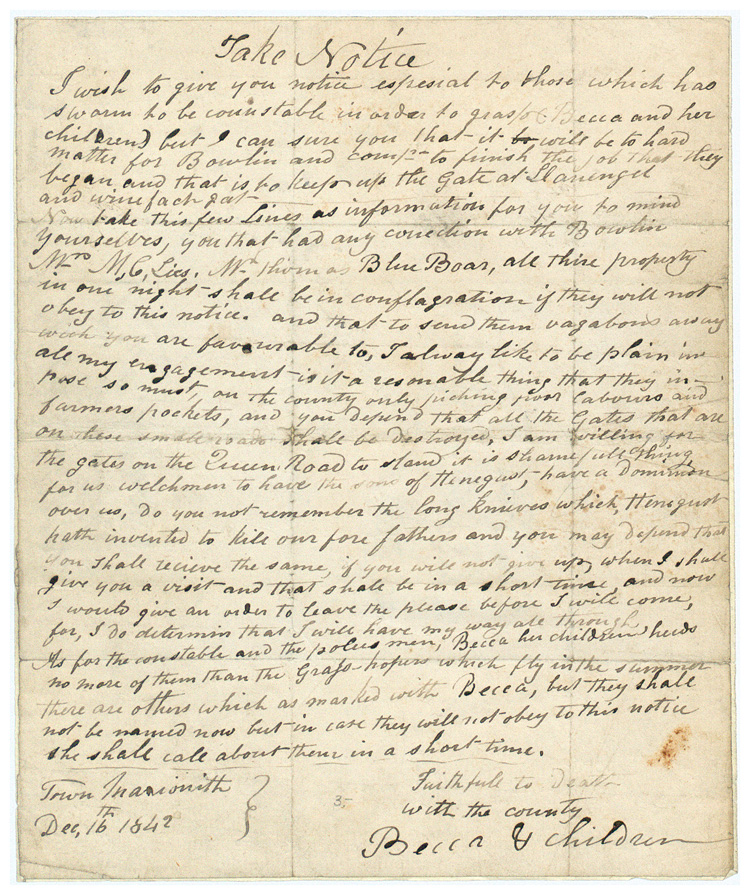
Rebecca letter, 16 December 1842 (HO 45/265 f1)
Transcript
Take Notice
I wish to give you notice especial to those which has sworn to be connstable in order to graspe Becca and her children but I can sure you that it will be to hard matter for Bowlin and company to finish the job that they began and that is to keep up the Gate at Llanengel and [?] gate. Now take this few lines as information for you to mind yourselves, you that had any conection with Bowlin Messrs M. C. Lics, Mr Thomas Blue Boar, all thine property in one night shall be in conflagration if they will not obey to this notice. And that to send them vagabons away wich you are favourable to. I alway like to be plain in all my engagement – is it a reasonable thing that they impose so must on the country only picking poor labours and farmers pockets, and you depend that all the Gates that are on these small roads shall be destroyed. I am willing for the gates on the Queens Road to stand it is a shamefull thing for us welchmen to have the sons of Henegust have a dominion over us. Do you not remember the long knives which Henegust hath invented to kill our fore fathers and you may depend that you shall recieve the same, if you will not give up, when I shall give you a visit and that shall be in a short time, and now I would give an order to leave the place before I will come, for, I do determin that I will have my way all through. As for the constable and the policemen, Becca her children heeds no more of them than the Grass-hopers which fly in the summer there are others which as marked with Becca, but they shall not be named now but in case they will not obey to this notice she shall call about them in a short time.
Faithfull to Death
with the county
Becca & children
Trwn [?]
Dec, 16th 1842
Glossary
those which has sworn to be connstable – local men sworn in by magistrates to help enforce the law, known as special constables
Bowlin – Thomas Bullin, chief collector of tolls and builder of gates in the area, an Englishman hated in Wales
Llanengel – Llanfihangel
conflagration – large fire
vagabons – vagabonds, people without a permanent home who move from place to place, often in search of food or work; can be used as an insult
Henegust – Hengist, leader of the Saxons in Britain in the early 5th century AD
long knives – The treachery of the long knives was an incident in the wars between the Saxons and the early British peoples. During a peace conference organised by Hengist, the Saxons drew long knives from their boots and killed the British nobility.
the policemen – George Martin, an inspector from the Metropolitan Police in London, and his two men (west Wales had no police force)
heeds – pays attention
Simplified transcript
Take Notice
I wish to give you notice, especially to those sworn in as constables in order to catch Becca and her children. I can assure you that it will be too hard for Bullin and company to finish the job that they began – to keep the gates up at Llanfihangel and [?]. Now take these few lines as information for you to watch yourselves, you that had any connection with Bullin, Messrs M. C. Lics, Mr Thomas Blue Boar. All your property shall be burned in one night if they will not obey this notice. Send away those vagabonds which you are favourable to. I always like to be plain in all my dealings with people. Is it a reasonable thing that they impose so much on the country, only picking the pockets of poor labours and farmers? All the gates that are on these small roads shall be destroyed. I am willing for the gates on the Queens Road to stand. It is a shameful thing for us Welshmen to have the sons of Hengist rule over us. Do you not remember the long knives which Hengist invented to kill our forefathers? You may depend on it, you shall receive the same if you will not give up when I visit you, and that shall be in a short time. Now I give an order to leave the place before I come, for I am determined that I will have my way. As for the constable and the policemen, Becca and her children pay no more attention to them than the grasshoppers which fly in the summer. There are others who are marked by Becca. They shall not be named now, but if they will not obey this notice, she shall call on them in a short time.
Faithfull to Death
with the county
Becca & children
Trwn [?]
Dec, 16th 1842
1. Look at Source 1. This letter was addressed to the inhabitants of St Clears and others in Carmarthenshire in 1842.
- Why does the writer of the letter sign it ‘Becca & children’ instead of giving their own name?
- Why are the special constables (‘those which has sworn to be constable’) being warned to take notice of this letter?
- Why does the letter object to ‘Bowlin and company’?
- What is the writer’s attitude to the police?
- How can we tell that the person who wrote this letter was not well educated?
- How does the language of the letter make it appear threatening?
